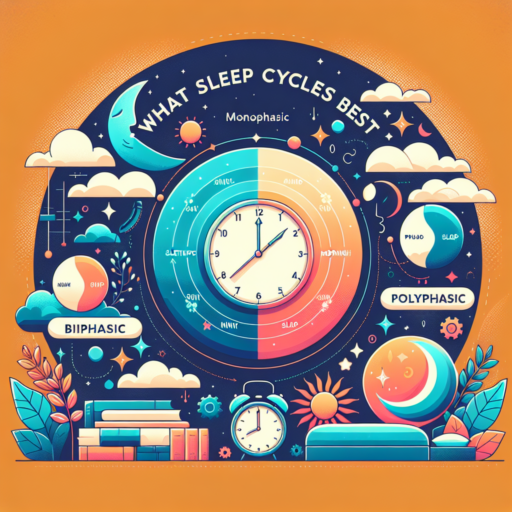Understanding the Sleep Cycle and Its Phases
Comprehending our sleep cycle is essential for improving sleep quality and overall health. The sleep cycle consists of several distinct phases, each playing a crucial role in our physical and mental replenishment. In this exploration, we delve into these critical phases to shed light on their importance and how they impact our well-being.
The Four Phases of Sleep
The human sleep cycle is divided into non-Rapid Eye Movement (NREM) and Rapid Eye Movement (REM) stages, which collectively play a key role in our cognitive functions and physical health. These phases include:
- NREM Stage 1: This light sleep phase acts as the bridge between wakefulness and sleep, lasting several minutes. It’s characterized by slow eye movement and reduced muscle activity.
- NREM Stage 2: Marking the onset of actual sleep, this phase sees further reduction in heart rate and body temperature, preparing the body for deep sleep.
- NREM Stage 3: Also known as deep sleep or slow-wave sleep, this phase is crucial for physical recovery, immune system boosting, and energy restoration.
- REM Sleep: This final phase is where most dreaming occurs, characterized by rapid eye movements, increased brain activity, and muscle paralysis. It plays a significant role in emotional regulation and memory consolidation.
The progression through these sleep phases forms the foundation of a restorative sleep cycle, important for ensuring our body and mind function optimally. By understanding the dynamics of these sleep phases, individuals can take proactive steps towards achieving better sleep hygiene and, consequently, enhancing their overall health and well-being.
How to Identify Your Ideal Sleep Cycle
Identifying your ideal sleep cycle is a pivotal step towards achieving optimal health and well-being. Each individual’s sleep requirements vary, making it essential to understand and recognize the signs that your body gives you regarding its need for rest. It begins with observing your natural sleep patterns and how you feel upon waking. Are you still tired, or do you feel refreshed and ready to start your day? By listening to your body’s signals, you can start to pinpoint the amount of sleep that works best for you.
Track Your Sleep Patterns
Start by tracking your sleep and wake times to identify your natural rhythm. Use a sleep diary or a sleep tracking app to monitor how many hours of rest you’re getting each night and the quality of that sleep. Note any instances of waking up during the night and how you feel in the morning. Over time, patterns will emerge that can guide you towards understanding your ideal sleep cycle. Pay particular attention to days when you wake up feeling particularly refreshed—what were your sleep habits like the night before?
Assess Your Daily Energy Levels
Another key factor in identifying your ideal sleep cycle is to assess how you feel throughout the day. Do you experience a mid-afternoon slump, or are you energized from morning till evening? It’s not just the length of sleep that matters but its quality and how it aligns with your body’s internal clock. Adjusting your bedtime gradually and observing the changes in your energy levels can be incredibly telling. Aim for a consistent sleep schedule, even on weekends, to help regulate your body’s clock and improve your overall sleep quality.
Understanding your ideal sleep cycle is not an overnight task but a personalized journey. By being mindful of your body’s preferences and the external factors that influence your sleep, such as stress levels and environment, you can make informed decisions that bring you closer to achieving restful, restorative sleep. Remember, the goal is not just to increase the number of hours you spend asleep but to enhance the quality of those sleep hours for better health and productivity.
The Benefits of Optimizing Your Sleep Cycle for Health and Productivity
Optimizing your sleep cycle is not just about getting more hours of shut-eye; it’s about enhancing your overall health and productivity. In an increasingly busy world, the quality of sleep can often fall by the wayside, yet its impact on our daily lives is monumental. Understanding the profound benefits of a well-regulated sleep pattern is the first step toward unlocking a healthier, more productive version of yourself.
Improving Physical Health
One of the most tangible benefits of optimizing your sleep cycle is the positive effect it has on your physical health. Quality sleep is linked to a myriad of health improvements, including strengthened immune system, reduced risk of chronic diseases such as obesity, diabetes, and heart disease, and enhanced athletic performance. Moreover, a regular sleep schedule supports the body’s healing processes, ensuring you can recover more swiftly from illness and physical exertion.
Boosting Mental and Emotional Well-being
A well-regulated sleep cycle is also a cornerstone of mental and emotional well-being. Sleep plays a crucial role in cognitive processes, improving concentration, memory retention, and problem-solving skills. Furthermore, adequate sleep has been shown to regulate mood and decrease the incidence of stress and anxiety, fostering a more positive outlook and greater emotional stability. This mental clarity and emotional balance are invaluable for navigating the complexities of daily life and achieving personal and professional success.
Debunking Myths: What Sleep Cycle Is Really the Best?
The quest for the ultimate sleep cycle has been a topic of considerable debate and confusion. With a plethora of myths surrounding what constitutes the ‘best’ sleep cycle, it’s crucial to separate fact from fiction. This exploration aims to shed light on the science-backed truths about effective sleep cycles, helping you understand how to tailor your rest for maximum rejuvenation.
One common myth is that everyone requires a uniform 8 hours of sleep to function optimally. However, sleep needs vary significantly among individuals, influenced by factors such as age, lifestyle, and even genetic predispositions. What’s more important is understanding the phases of sleep—mainly Rapid Eye Movement (REM) and non-REM sleep—and how they contribute to restorative rest.
Another misconception is the idea of ‘making up’ for lost sleep with weekend sleep-ins, which supposedly resets your sleep cycle. In reality, this disrupts your body’s internal clock, leading to poorer sleep quality in the long run. Consistency in your sleep and waking times is paramount, aligning your sleep cycle more closely with your body’s natural circadian rhythms for better overall health and alertness.
Practical Tips for Adjusting Your Sleep Cycle for Better Sleep Quality
Improving your sleep cycle requires consistent efforts and a few strategic changes to your daily routine. Incorporating specific practical tips can significantly impact your overall sleep quality. Whether it’s adjusting to a new time zone, recuperating from disruptions in your sleep patterns, or simply aiming to have a restful night, these methods are designed to align your body’s internal clock with your desired sleep schedule.
Establish a Regular Sleep Schedule
Maintaining a consistent bedtime and wake-up time each day is crucial for setting your body’s internal clock. Even on weekends or days off, try to stick closely to your schedule. This regularity not only enhances the quality of your sleep but also helps in falling asleep and waking up more effortlessly. It’s a fundamental step for anyone looking to adjust their sleep cycle effectively.
Optimize Your Bedroom Environment
Your bedroom’s ambiance plays a significant role in how well you sleep. Make your sleeping environment conducive to rest by eliminating excessive noise and light. Consider using blackout curtains, eye shades, or white noise machines if needed. The temperature of the room should also be comfortable, ideally cool. Investing in a comfortable mattress and pillows further optimizes your sleep quality, making it easier to fall asleep and stay asleep.
Leverage Light to Your Advantage
Light exposure significantly influences your sleep cycle. Leverage natural light as much as possible during the day to help maintain your circadian rhythm. In contrast, avoid bright screens and harsh lighting during the evening to signal your body that it’s time to wind down. Integrating this into your routine can play a pivotal role in adjusting your sleep cycle for the better.
No se han encontrado productos.
How Technology Can Help You Find Your Optimal Sleep Cycle
Our lives are intertwined with technology in almost every aspect, including how we sleep. Using technological advancements, finding your optimal sleep cycle has become not just a possibility but a reality for many. This is crucial because a proper sleep cycle can significantly improve your overall quality of life.
Tracking Sleep Patterns with Smart Devices
Smart devices and wearable technology have revolutionized the way we understand our sleep. Tools such as smartwatches and fitness bands come equipped with sensors that monitor your sleep duration, quality, and stages. They analyze your movements and heart rate to provide insights into your light, deep, and REM sleep cycles. By interpreting this data, you can start to notice patterns and irregularities in your sleep schedule, allowing for adjustments towards achieving a more balanced and restorative sleep cycle.
Utilizing Apps for Sleep Analysis and Improvement
Along with wearables, numerous smartphone apps are designed to help you discover your optimal sleep cycle. These apps can record sounds to detect snoring or sleep apnea, use gentle alarms to wake you during your lightest sleep phase, and even provide white noise or calming sounds to help you fall asleep. By leveraging these technological aids, you can adopt habits that contribute to a more consistent and refreshing sleep pattern, inching closer to finding your optimal sleep cycle.
Technology’s role in our sleep cycles is an example of how digital tools can improve our health and daily routines. With consistent use and analysis of data from smart devices and apps, one can tailor their sleep habits to match their body’s natural rhythms, leading to better rest and, consequently, a more energized and productive lifestyle.
The Impact of Age, Lifestyle, and Health on Your Sleep Cycle Preferences
Understanding how age, lifestyle, and health affect your sleep cycle preferences is crucial for maintaining optimal well-being. As we navigate through different stages of life, our internal clock, known as the circadian rhythm, undergoes significant changes. These changes are deeply influenced by various factors, including our age, the way we live our lives, and our overall health condition.
Age plays a pivotal role in determining our sleep cycle preferences. Newborns and young children, for instance, require more sleep and have different sleep patterns compared to adults. This is due to the developmental needs of their brains and bodies. As individuals age, they may find a shift in their sleep patterns, with older adults often experiencing earlier bedtimes and wake times. This shift can be attributed to changes in the secretion of melatonin, the hormone that regulates sleep, emphasizing the importance of understanding these natural adjustments as we age.
Our lifestyle choices equally impact the quality and structure of our sleep. Factors such as stress, exposure to blue light from screens, irregular working hours, and physical activity levels directly influence our ability to fall asleep and stay asleep throughout the night. For instance, engaging in regular physical activity can promote better sleep health, whereas excessive screen time can significantly disrupt our sleep cycle. Recognizing and adapting our habits can lead to improved sleep quality and, by extension, better overall health.
The state of our health is another crucial component affecting sleep cycle preferences. Conditions like insomnia, sleep apnea, anxiety, and depression can severely disrupt normal sleep patterns, leading to a preference for longer or more erratic sleep times. Understanding the interplay between health conditions and sleep is essential for developing effective strategies to enhance sleep quality. Consequently, addressing health issues, whether they be physical or mental, can have a profound impact on restoring natural sleep cycles and preferences.
Case Studies: Success Stories of Finding the Best Sleep Cycle
Discovering the most beneficial sleep cycle can be a game-changer for many, enhancing overall well-being, productivity, and even cognitive function. Through various case studies, individuals have unearthed personalized sleep patterns that significantly improve their day-to-day lives.
Understanding Individual Sleep Needs
Each person’s optimal sleep cycle can differ dramatically based on genetics, lifestyle, and health conditions. The case studies demonstrate that by paying close attention to sleep quality and daytime alertness, individuals have been able to tweak their bedtime habits towards achieving their best possible rest. From adjusting sleep durations to experimenting with segmented sleep, these stories underline the importance of personalization in finding the ideal sleep cycle.
Impact of Technology on Sleep Optimization
Advancements in technology have played a pivotal role in helping individuals fine-tune their sleep cycles. Wearable devices that monitor sleep stages, smart alarms designed to wake you up gently during your lightest sleep phase, and apps that provide insightful sleep analytics have all contributed to this quest for the perfect night’s sleep. These case studies highlight how leveraging technology has enabled a deeper understanding of sleep patterns, leading to more precise adjustments in sleep habits.
Among the most inspirational takeaways from these case studies is the significant improvement in quality of life reported by participants. With a tailored approach to finding the best sleep cycle, many have reported feeling more energized, less stressed, and more productive throughout their day. This exploration into optimal sleep underlines the profound impact that proper rest has on our overall health and performance.




